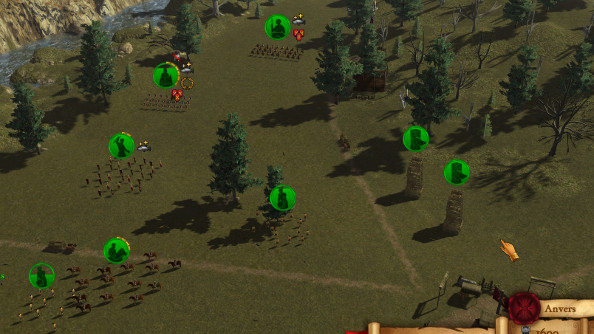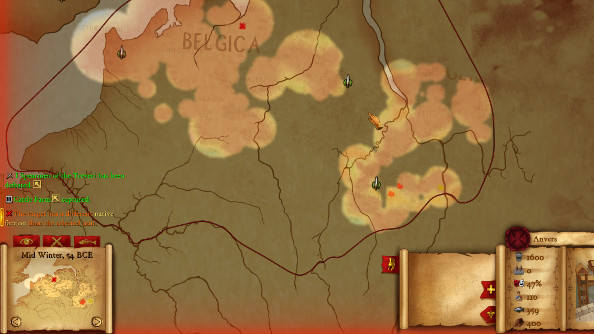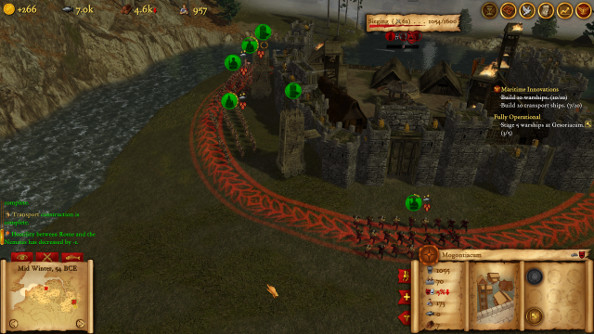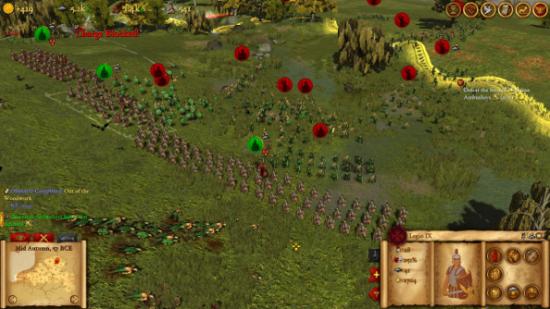Here is my dilemma with Hegemony Rome: The Rise of Caesar: it’s boring as hell; but it’s also irresistible.
What do you make of a game that seems to exist in a state of quantum superposition, both dull and exciting, mediocre and brilliant? Why is one of the best games ever made about the Roman Empire also one of the least sexy?
The Romans define Empire for most westerners. Hell, every successive European empire could not help embracing some of its trappings. They either overtly claimed the mantle of Rome, as the Holy Roman Empire did, or they clad themselves in Neo-Classicism meant to evoke their illustrious predecessors. Napoleon even gave his regiments imperial eagles.
Against all of this weight of history and popular memory, Roman rule can feel a little inevitable. Gladiator gave voice to this in its opening scene, as two Roman generals watch a German tribe emerge from the forest and scream a challenge to the assembled Roman legions.
“People,” Quintus remarks drily, “should know when they’re conquered.”
Hegemony Rome: The Rise of Caesar is not about the popular memory of Rome. It is not about serried ranks of crimson-cloaked legionaries and the weaponized Stoics leading them. It’s not about the roar of the crowd at the arena, or the Machiavellian maneuverings of geriatric senators trying to rule the world without being changed by it.
It’s about the details of Roman conquest. It’s about battles won because one side still had food and the other didn’t, about how infrastructure pumps the blood of an empire but also saps it of vitality. It’s about having too many enemies and too few friends, and never enough money or manpower to deal with both. And it’s about the sheer absurdity of waging war across hundreds of miles with armies that can only move at the speed of foot, where the distance between two fronts can be a nearly a season’s march.
Victory is far from inevitable. It requires a lot of planning and patience. Maybe too much.

Where’s my abacus?
Hegemony is a very slow game. Things can happen very quickly, of course. It’s still a real-time strategy game where you’ll have only seconds to react when an enemy army appears on your flank and begins moving to strike. But that flank attack might be happening all the way down in Toulouse while the nearest reinforcing army is wrapping up a campaign outside Antwerp. In that case, you have to get your troops moving on a 15-minute real-time walk to the new battlefield. Hope you brought a book.
And yet Hegemony keeps you busy with details, even when nothing seems to be happening. You must constantly make the rounds of your holdings, ensuring that your conquered cities are still enjoying Pax Romana, that all your lumber camps and gold mines are fully staffed by workers or (far more likely) slaves. Are your armies up to full-strength? Who needs to be shifted off the front, and are your native auxiliaries loyal enough to Rome to stand and die for it against their ethnic kin?
This workload is never-ending, and it just gets larger as your empire expands. Hegemony Rome is like Checkbook Balancing Simulator 2014.
Except, like a lot of the strangely compelling sim games, Hegemony’s fascination with process and detail ends up being deeply satisfying. You construct new supply lines and depots to keep your armies well-fed and motivated as they go to war. You shut down old forts and supply lines that no longer serve a purpose. You slowly shift your armies into position, trying to guess how many troops you’ll need for the job. After all, there’s always an unquiet frontier that needs some more soldiers policing it. Your cavalry rides into the enemy countryside, scouting for cities, armies, and paths of attack. Finally, when the forward supply depots are fully stocked and you invasion force is assembled, you march.
Then a bunch of Germans come and attack your somewhere else while your back is turned and you have to do it all over again, in the other direction.
Screw this game. It’s awesome.
The forest for the trees
This is all taking place on an absolutely sprawling map of France. Modern life has conditioned us to lose sight of what distances actually meant in the pre-industrial world, but Hegemony Rome makes you realize just how much territory there is between Spain and Germany, and how difficult it is to control when you can only move at the speed of march. You can be zoomed all the way in on an Aquitanian battlefield, watching lines of infantry drawn up for a clash while cavalry skirmish on the flanks, and then you pull back the camera.
The units become tiny and resolve into counters. The battlefield vanishes into a parchment map of the entire province, with cities and supply lines criss-crossing it. Then you scroll back farther and the province shrinks to the size of a fingertip, and you are seeing the map of France from the Channel to the Alps, from the Pyrenees into Germany. What you can see with your line of sight is nothing but tiny pockets of illumination. The rest of the map is darkened, unknown territory.

Somehow, by fighting battles like the one taking place right now, by managing those provinces and those supply lines, you are supposed to conquer all that territory. You’ve been playing for 10 hours and you’ve hardly begun.
That often leaves me feeling like I’m sitting down to a banquet. The road to conquest stretches out before me, full of knotty supply problems, proud armies in-waiting, do-or-die battles on distant frontiers.
But then I think about how much of this game is really whack-a-mole. How the AI rarely seems to mount a coordinated campaign against you, but instead forces constant policing and the re-taking of old ground. How the core problems rarely ever change, just increase in size and amount of work they take to solve. Instead of supplying one legion you’re trying to stockpile enough food for 12 of them. Instead of pacifying one Gallic city, you’ve got to tamp down resistance in eight of them. Thank God you can pause the game, or the workload would be completely unmanageable.
The campaign even exacerbates these problems because of the artificial boundaries it puts around you. You can get attacked every ten minutes by the same group of Belgians, but you can’t cross the magic line to go put a stop to their shit once and for all. Instead, you just deal with the constant harassment.
Yet there is also something brilliant about this. So much of Roman foreign policy was really just yelling, “Ow! Quit it,” again and again until finally some Romans lost their tempers and exterminated an entire tribe.
Divide and conquer
But you can’t do it all at once. This is something else that contributes to Hegemony’s slow pace. Something that comes through in Caesar’s commentaries is the fact that the Gauls never understood, until it was far too late, just who it was they were dealing with. They viewed the Romans as yet another tribe, a strong one that could be manipulated and exploited to settle internecine conflicts.
Diplomacy in Hegemony is not as nuanced as it could be, but there’s an elegant simplicity to it. Nobody is loyal, but gold can buy peace and allies. But gold is not a storable resource. It is a current. Every new army and every new peace treaty diverts some of the stream and reduces the amount of cashflow you have available. So you have to think about what peace treaty will the most valuable, headache-curing one, which tribes are better off guarded but ignored, and which ones you need to conquer immediately.
Get it right and slowly, piece by piece, Gaul will fall under your sway. Get it wrong and your frontiers will collapse as your overstretched armies get crushed by an onslaught of enemies, and you’ll have to fall back to a safe position. Then, after licking your wounds, you’ll have to rebuild.

I’m not sure you could ever prise the good things in Hegemony apart from the bad. A better AI with a finer grasp of the game’s objectives might help, but it might also be beside the point. Hegemony is about making the player the one with a grand vision, in a world full of people who can’t think beyond the next river, or the next valley.
More importantly, all this slow, grinding detail is what makes Hegemony such a brilliant treatment of Roman warfare. There may not be another game that has understood the subject so well, and that makes it well worth exploring. You want to be a great Roman general? Then count your food, count your money, and count your enemies. If you’ve done the math right, then you’ve already won before the battle is even fought.
Still, I wish I didn’t feel like I was on autopilot for so much of the time, or that the correct strategy was so one-size-fits-all. When Fraser and I talked about the game on Three Moves Ahead, I was much more forgiving of it, but after 25 hours, my admiration for its treatment of Roman warfare is starting to fade into impatience with the rote processes it imposes on me. Hell, that mission the forces you to build 30 ships for the invasion of England is a crime of level design.
There is much to be said for Hegemony Rome, and sometimes simple problems do become more interesting if taken to a larger scale. But a truly great strategy game should never be this repetitive, even if the Romans did like their conquests nice and methodically predictable..
So as the poet Catullus wrote, odi et amo, ergo:
